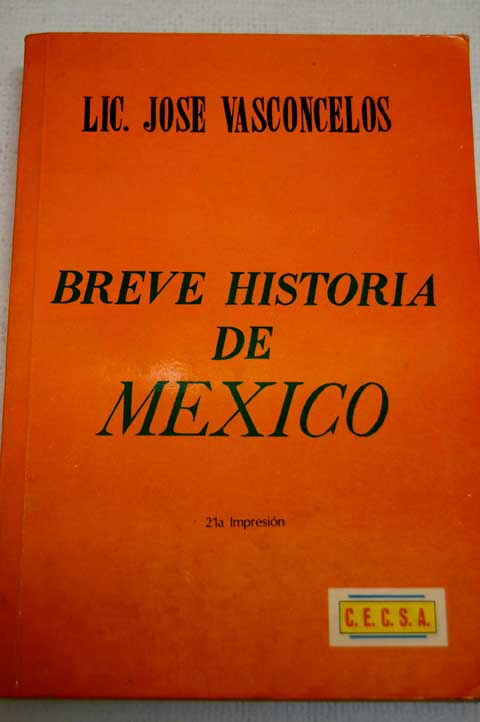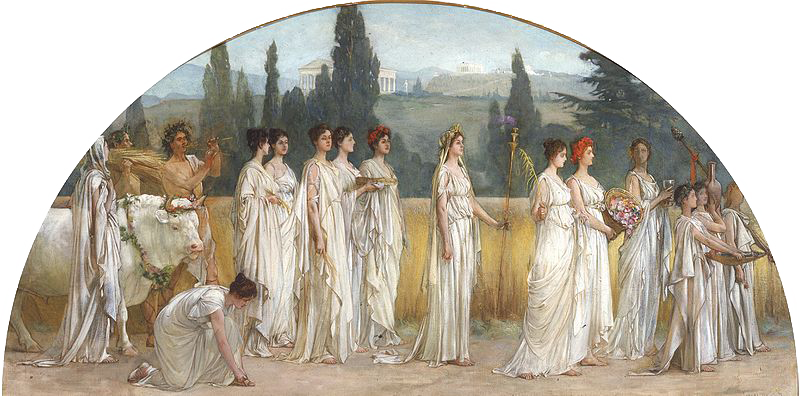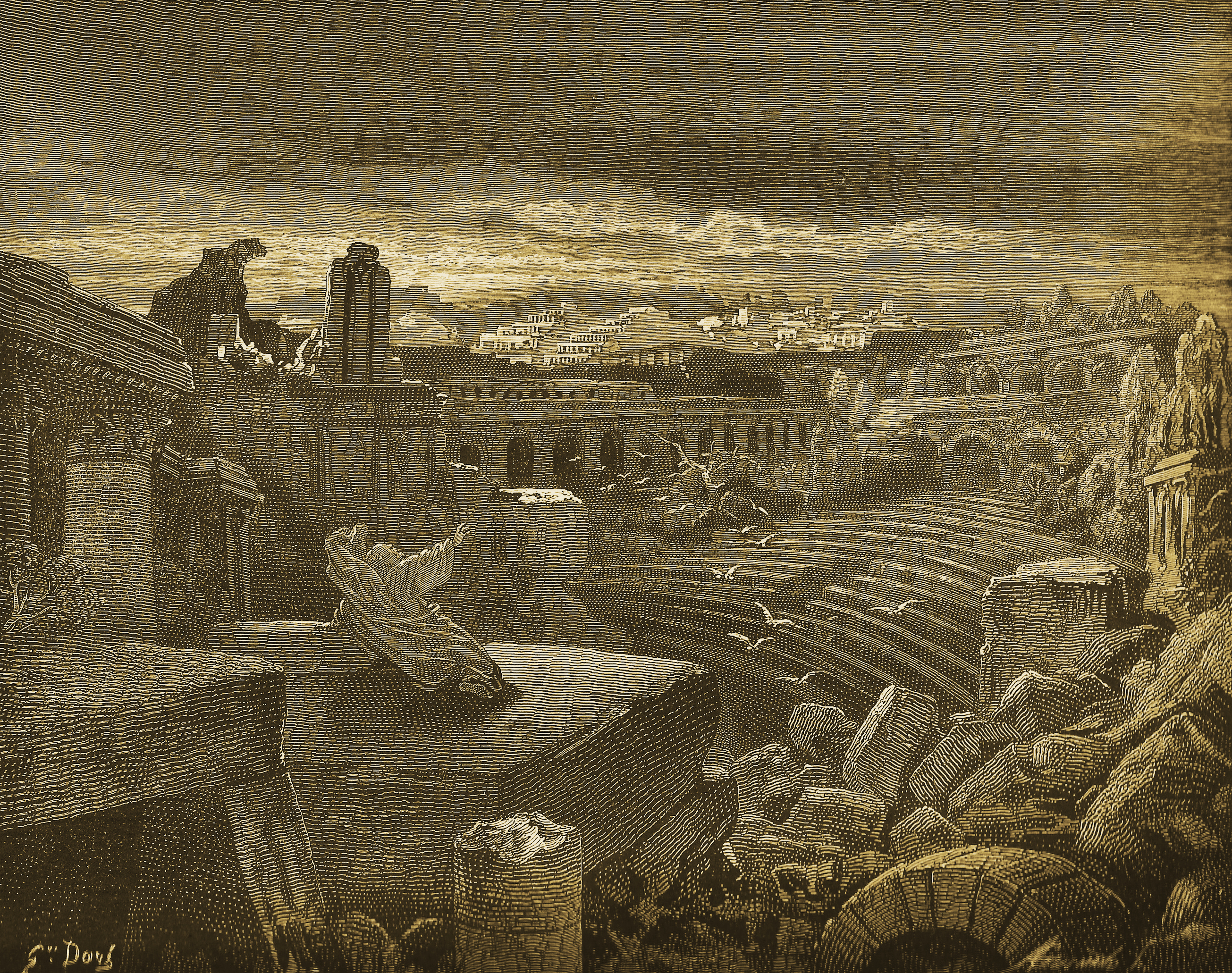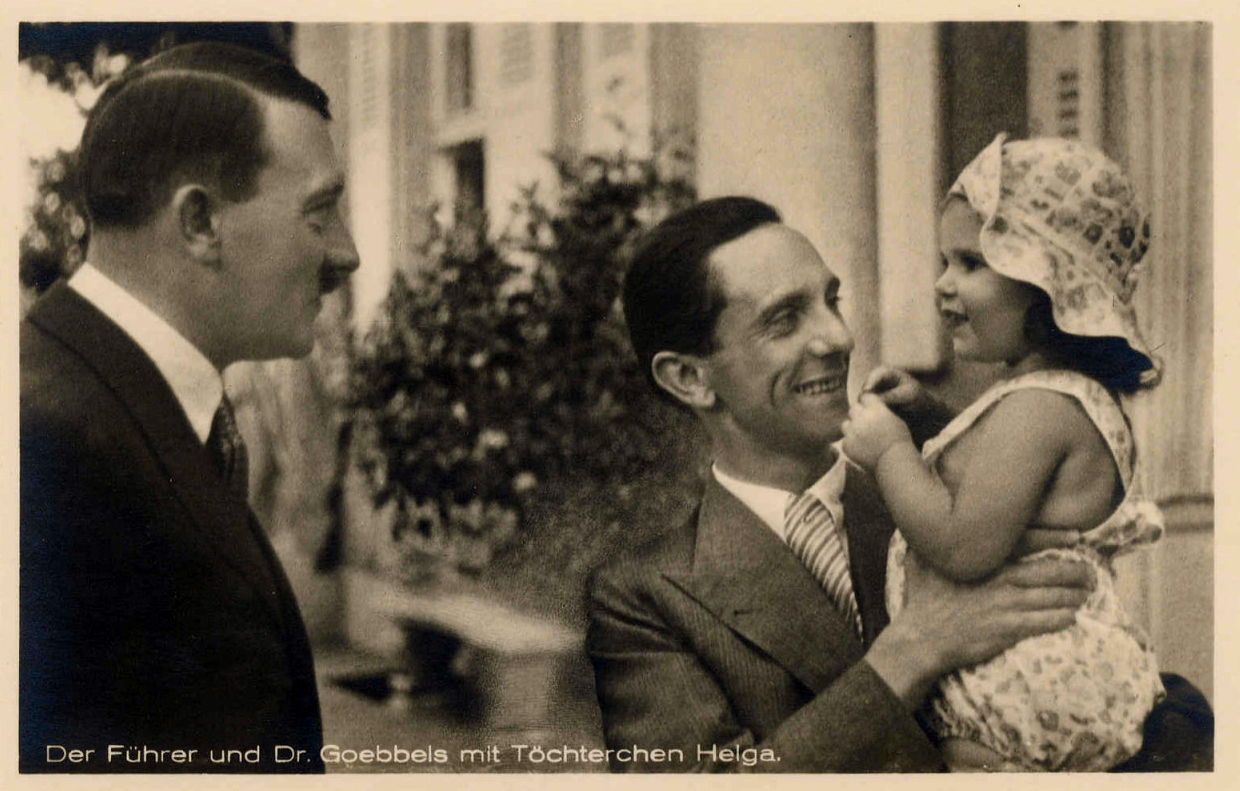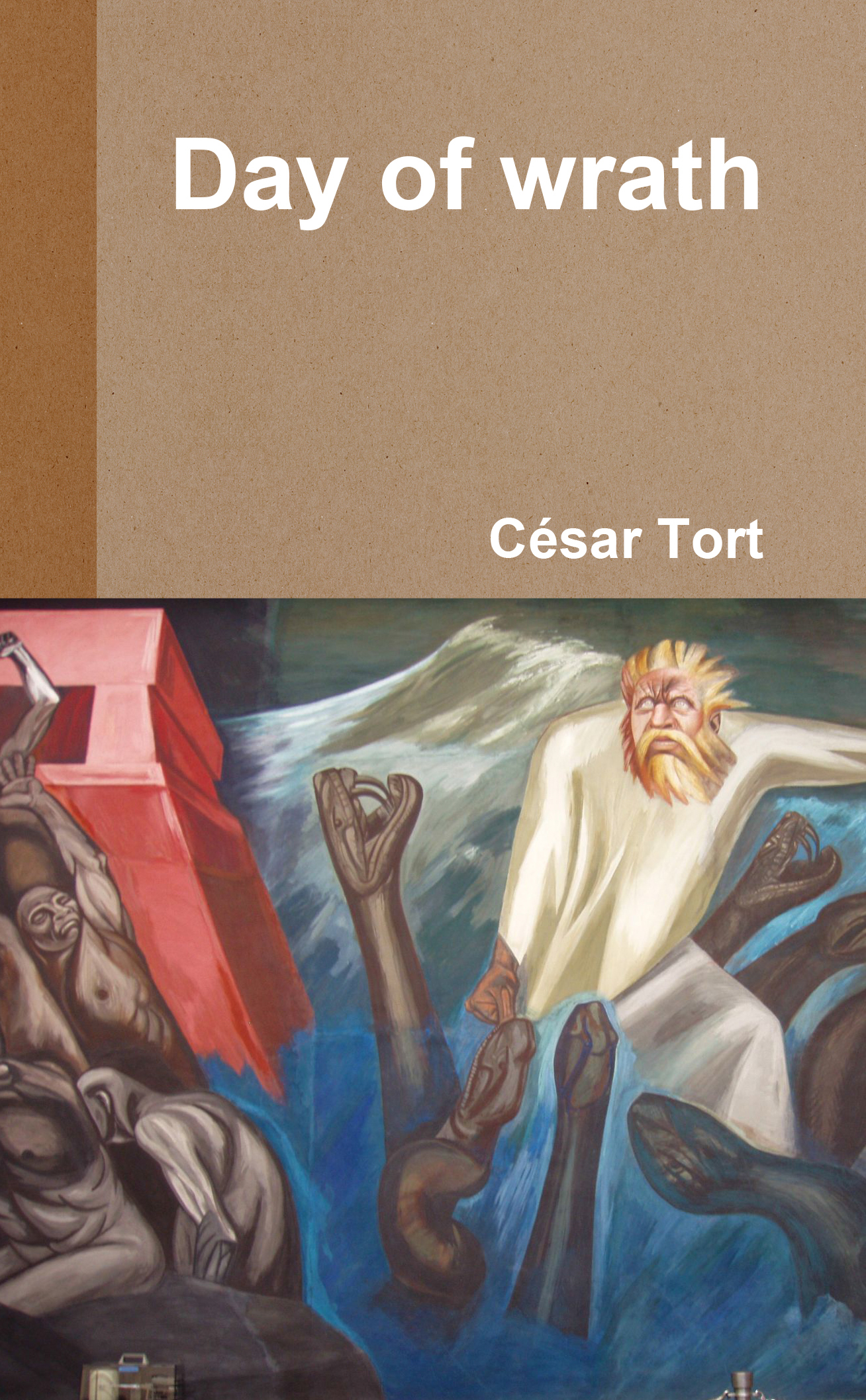 Four years ago I had posted this chapter here but now, that I’ve used engines to check the grammar, I realised the old text was plagued with syntactic inaccuracies. Although I feel it is greatly improved (see below) I can never be sure as English is not my native language. Now that the revision is almost compete, as soon as I order a proof copy, and get it from Amazon Books, the softcover will be available again for the general public.
Four years ago I had posted this chapter here but now, that I’ve used engines to check the grammar, I realised the old text was plagued with syntactic inaccuracies. Although I feel it is greatly improved (see below) I can never be sure as English is not my native language. Now that the revision is almost compete, as soon as I order a proof copy, and get it from Amazon Books, the softcover will be available again for the general public.
______ 卐 ______
(Abridged Spanish-English translation
from the introduction to ¿Me Ayudarás?)
Men are the devils of the earth, and
animals are their tormented souls.
—Schopenhauer
At fifty-three, I received a surprise in what in Hojas Susurrantes I call the cursed house. Someone had left a box on the shelf outside the bathroom for visitors. When I opened it I saw something that amazed me. A divine little animal! He looked like a very young bunny but it was so beautiful and graceful that it could not be a rabbit, I told myself. It took me a long time to recognize that he was really a white bunny, but so otherworldly it seemed to me that I had difficulty in reconciling my two hemispheres: one telling me that it could only be a divine creature, and another telling me that it was a little rabbit that had come into the world not long ago.
Almost abandoned in a non-custodial box, it had been one among many gift bunnies to the kids at a birthday party that one of my irresponsible siblings had bought, the father of the celebrated child. Elsewhere I might tell how I came to interact with the creature, whom I would rescue from an uncertain destiny due to the pettiness of my family and the Mexicans in general. I had never interacted in such way with an animal before. In fact, I had never wanted to have a pet even though I did not get married and have no offspring. But seeing a being so helpless and at the mercy of the modified apes in my family moved me to adapt it. Elsewhere I may tell anecdotes, but the only thing I can add now is that, over time, the white rabbit would help me in my way out from the inverted world of Alice.
A little less than two and a half years later I would receive a great shock. The Mirror reported that four teenagers from Seaham in Durham, England, tortured and murdered Percy: a bunny who, in the picture that can be seen online with the naked young people, seems identical to my pet; now, an adult rabbit. They tried to shave and rape Percy; set her on fire, tried to drown her and then threw her dying but still alive from the window. The human monsters, all white, even recorded on their cell phone what they did: a video that the owner of the bunny could not see when the police arrested the perpetrators; only a frozen image to identify it. The punishment for these criminals was negligible in today’s Britain. I would have tortured them—exactly what they did to the rabbit—and then cast them out the window to let them die in agony lying on the ground (eye for an eye). In fact, if by a miracle of fate an extraterrestrial force had empowered me on my latest visit to the United Kingdom, I would have done it.
We must bear in mind that if the Anglo-Saxon demons had allowed Germany an empire from the Atlantic to the Urals, in the areas under the Nazi flag the torment of the animals would have been greatly reduced. Personally, I regard Hermann Göring one of my patron saints: and he should also be for those who long for a world free of this type of abuse. Let us not forget the 1933 caricature in which the freed animals—“No more vivisection! No more experimentation with animals!”—salute their savior Hermann.
 Unlike my beloved Nazis, in one of my blogs I spoke of what non-Nazis are capable of doing with defenseless animals. I mentioned fur coats factories in China where some mammals are skinned alive; farms in Mexico where they hang rabbits from their ears until they die, which has also happened in some Australian farms. That and what they did to Percy pierced my soul. Her photograph in The Mirror shows her in a posture of serene confidence before the humans who would torture her: identical image to the postures of my own little bunny who, accustomed as Percy was to her benign owner, relaxes placidly in human presence. The betrayal of the universe that Percy had to experience before the change from her angelic owner to human devils must have been such that I caressed the idea of dedicating this volume to her memory.
Unlike my beloved Nazis, in one of my blogs I spoke of what non-Nazis are capable of doing with defenseless animals. I mentioned fur coats factories in China where some mammals are skinned alive; farms in Mexico where they hang rabbits from their ears until they die, which has also happened in some Australian farms. That and what they did to Percy pierced my soul. Her photograph in The Mirror shows her in a posture of serene confidence before the humans who would torture her: identical image to the postures of my own little bunny who, accustomed as Percy was to her benign owner, relaxes placidly in human presence. The betrayal of the universe that Percy had to experience before the change from her angelic owner to human devils must have been such that I caressed the idea of dedicating this volume to her memory.
Although what those damned humans did in Durham was condemned by other Englishmen, so-called normal people are not left behind. Humans whom I consider exterminable are able to pour concentrated solutions into laboratory rabbits, and to prevent them from closing their eyes, hold their eyelids with tongs. How many women ignore that their cosmetic products have been tested in this way… This happens today with the approval of society precisely because the Second World War was won by the wicked. Few know that from 1944 to 1947 the Soviets and the Americans, including Jews on both sides, practiced a real holocaust of Germans, the “Hellstorm,” preventing among other things that the benign policies of Hermann, who had saved our mammals cousins in the very brief historical window that represented the Third Reich, were implemented in the West after the war.
Science philosopher Thomas Kuhn used the optical illusion of the duck-rabbit to show how a paradigm shift causes one to see the same information in a completely different way. If Westerners had not been brainwashed, instead of seeing a duck (the Nazis were bad) they would see a rabbit (actually they were the good guys). I noticed this psychological phenomenon in 1992 when I studied the so-called Faces of Bélmez in a small town in Andalusia.
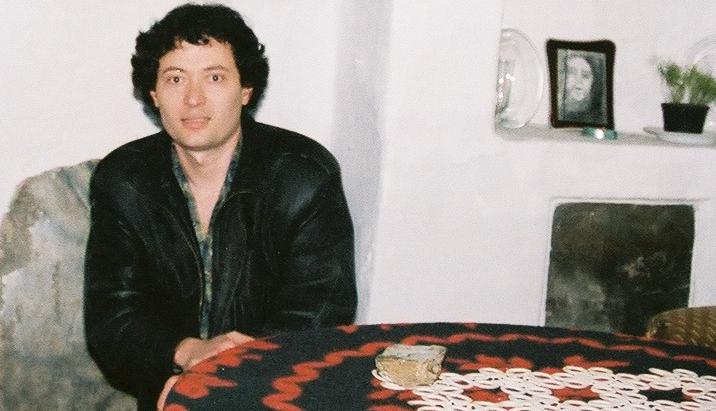 (The author at thirty-three in Spain’s “House of the Faces”.) Originally I believed that the faces of Mrs. María Gómez Cámara’s kitchen were a paranormal phenomenon until, once, seeing the face called “La Pelona” (part of the concrete block with this image is behind my back in the photo above), I made a change in my inner subjectivity. I experienced the sensation that the crude strokes of the face were the work of a human hand, debunking the parapsychological investigation in which I had placed my hopes. Perhaps in the future I will have a life to write the details of that adventure in Spain. Suffice it to say that the paradigm shift comes from the internal will. Following Kuhn’s example, the volitional faculty of my mind stopped seeing a bird and discovered another small animal.
(The author at thirty-three in Spain’s “House of the Faces”.) Originally I believed that the faces of Mrs. María Gómez Cámara’s kitchen were a paranormal phenomenon until, once, seeing the face called “La Pelona” (part of the concrete block with this image is behind my back in the photo above), I made a change in my inner subjectivity. I experienced the sensation that the crude strokes of the face were the work of a human hand, debunking the parapsychological investigation in which I had placed my hopes. Perhaps in the future I will have a life to write the details of that adventure in Spain. Suffice it to say that the paradigm shift comes from the internal will. Following Kuhn’s example, the volitional faculty of my mind stopped seeing a bird and discovered another small animal.
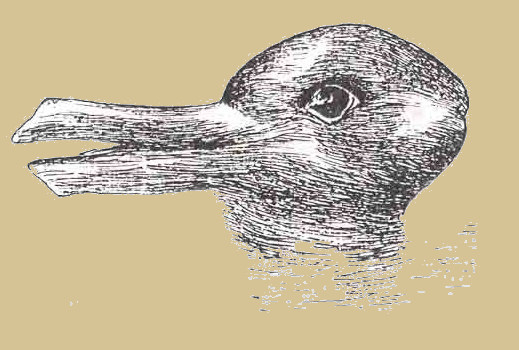 The same can happen in our inner eye as we transcend Christian and neo-Christian values to their National Socialist antithesis. Many white nationalists, mostly Christian theists and Neochristian atheists, are frightened by The Turner Diaries. Unlike William Pierce, with their stupid love for the modified apes they condemn other animals to a torture of millennia—as potentially the Aryans, who are extinguishing themselves, are capable of becoming Görings. For a truly integrated individual it is obvious that moral is putting a screeching stop to the sadism towards our cousins, and the only way to do this is to get rid of the human devils. A change from love to hatred towards sinful humanity—great hatred I mean: a hatred à la Yahweh in the mouth of Jeremiah—represents a paradigm shift.
The same can happen in our inner eye as we transcend Christian and neo-Christian values to their National Socialist antithesis. Many white nationalists, mostly Christian theists and Neochristian atheists, are frightened by The Turner Diaries. Unlike William Pierce, with their stupid love for the modified apes they condemn other animals to a torture of millennia—as potentially the Aryans, who are extinguishing themselves, are capable of becoming Görings. For a truly integrated individual it is obvious that moral is putting a screeching stop to the sadism towards our cousins, and the only way to do this is to get rid of the human devils. A change from love to hatred towards sinful humanity—great hatred I mean: a hatred à la Yahweh in the mouth of Jeremiah—represents a paradigm shift.
Do you remember the quote from Arthur Clarke’s Childhood’s End that I included in the fifth and final book of Hojas Susurrantes? In this novel human beings are metamorphosed into a higher entity. I will quote one of those passages again. In the novel “Karellen” was the leader of the extraterrestrial visitors, physically indistinguishable from the iconography of the devils:
“If you want a single proof of the essential—how shall I put it—benevolence of the Overlords, think of that cruelty-to-animals order which they made within a month of their arrival. If I had had any doubts about Karellen before, that banished them—even though that order has caused me more trouble than anything else he’s ever done!
That was scarcely an exaggeration, Stormgren thought. The whole incident had been an extraordinary one, the first revelation of the Overlords’ hatred of cruelty. That, and their passion for justice and order, seemed to be the dominant emotions in their lives—as far as one could judge them by their actions.
And it was the only time Karellen had shown anger, or at least the appearance of anger. “You may kill one another if you wish,” the message had gone, “and that is a matter between you and your own laws. But if you slay, except for food or in self-defense, the beasts that share your world with you—then you may be answerable to me.”
No one knew how comprehensive this ban was supposed to be, or what Karellen would do to enforce it. They had not long to wait.
The Plaza de Toros was full when the matadors and their attendants began their processional entry. Everything seemed normal; the brilliant sunlight blazed harshly on the traditional costumes, the great crowd greeted its favorites as it had a hundred times before. Yet here and there faces were turned anxiously towards the sky, to the aloof silver shape fifty kilometers above Madrid.
Then the picadors had taken up their places and the bull had come snorting out into the arena. The skinny horses, nostrils wide with terror, had wheeled in the sunlight and their riders forced them to meet their enemy. The first lance flashed—made contact—and at that moment came a sound that had never been heard on earth before.
It was the sound of ten thousand people screaming with the pain of the same wound—ten thousand people who, when they had recovered from the shock, found themselves completely unharmed. But that was the end of that bullfight, and indeed of all bullfighting, for the news spread rapidly.
Before I woke up to the real world and stopped diabolizing Hitler, Childhood’s End had been my favorite book. Now I see that the devil Karellen, as Clarke painted him, was too magnanimous with humans. The mere fact that there are seedy slaughterhouses should move us to take more drastic measures than those of that character.
In Mexico the calves are enclosed in compartments so narrow that they cannot even turn inside the cage. As adults, farmers cut horns, castrate and mark with iron without anesthesia. In trucks on the way to the slaughterhouses, the animals sometimes spend more than a day without food or drink, arriving thirsty and dizzy to the Inferno. The first thing the poor animal sees in the slaughterhouse is a Dantesque spectacle: puddles of blood and corpses skinned or torn from other cows; severed heads on the ground… She enters the first circles of hell in a state of panic. At the seventh circle the blow that the slaughterer gives the cow’s head does not always kill her. Sometimes this noble animal is only wounded, in a state of shock and with the deepest pain, wondering without language why the demons of Hell do what they do to her. Humans are so exterminable that they throw live pigs into a pond of boiling water so that the pain of the Gehenna fire causes the animal to release its hairs. (In Mexico people are fond of eating pork rind—a delicacy for my father by the way—and they dislike seeing hairs on it.) The Spaniards do not stay too far behind. They prepare the bull in a bullfight to make it less dangerous: they cut off the tips of the horns, they put vaseline on his eyes to cloud his vision and an irritating solution on his legs so that the bull is always moving in the ring. (Long before they would have stuck a needle in his genitals to atrophy its growth.) They put tow in the nose to make it hard for him to breathe, they give him strong laxatives before the bullfight, and hit his loins and kidneys with sacks before he faces the bullfighter. And let’s not talk about what can be seen on television at both sides of the Atlantic once the bull goes out to the arena.
Only until now can the strength of my unconscious be glimpsed during my dream in Madrid [recounted also in the introduction to ¿Me Ayudarás?]. If we pass the dream from the unconscious not only to consciousness but to super-consciousness, it means that most human beings should not exist. It is not enough that, according to the polls, most Spaniards of today do not care about bullfighting. The mere fact that they and other peoples are involved in the chain of cruelty to animals—whether using a feminine vanity product that was experimented in the eyes of a bunny or gobbling fried skin from a pig that had been submerged alive in boiling water—should be enough to arouse the exterminationist hatred of the savior devil. Consider for example this passage from a comment by one J. Marone, who in 2005 reviewed for Amazon Books Slaughterhouse: The Shocking Story of Greed, Neglect, and Inhuman Treatment Inside the US Meat Industry:
Cows, pigs and chickens are taken through the slaughter house alive. Cows are often alive all the way through the line, this includes while they are getting their legs chopped off with cutters—imagine that… They do not stop the line for these inconveniences. The workers shove electric prods in their rectums and eyes—deep into the sockets occasionally pulling out the eye to get them moving to the slaughter line.
After reading this I will never eat another piece of meat again. It is not my decision to make any other living thing suffer. But I find it amazing that when you go to share this book, people don’t want to know. They would rather stay ignorant and that in itself has shocked me tremendously.
The italics in the last paragraph are mine and express why it is not enough for humans to claim ignorance, as almost every adult has heard what happens in the slaughterhouses.
When in my preparations to write this chapter I began to read what was happening in those places, I promised myself, like Marone, not to put again pieces of mammalian or bird carcasses into my mouth. I do not believe in the postmortem survival of the soul. However, until one has stopped eating meat (or derivatives from tormented animals), a part of our soul remains unawakened. This goes back to what was stated in the previous pages, which expose the psychogenic evolution of man. If in childrearing the Spaniards represented a psychogenic quantum leap compared to the Amerindians who still ate the flesh of their children, a new leap means to develop, in our times, empathy towards our cousins of the animal kingdom. Unlike Hitler and the vegetarians at the top of the Nazi party most Aryans have not gone through that leap, not even neo-Nazis. It is enough to see the photographs of mammals in laboratory experiments that are carried out throughout North America and Europe to perceive that the human being is truly a wicked species. I will not incur the rudeness of adding those photographs in this text: a task I leave to my readers.
My exterminating fantasies would not seem unhealthy if we do another thought experiment. In Dies Irae I quoted a non-fiction book by Arthur Clarke where he talked about the “judgment from the Stars” that earthlings could experience. If we imagine that in real life someone similar to a Karellen visited our planet, what is the first thing he would see from his distant silver ships, far above the human tingling? Urban spots. Industries that destroy the environment and, bringing his cameras closer, abject human misery and inconceivable suffering of the other species that share the planet with us. If, as in Clarke’s novel, the visitor also possessed machines to open a visual window to the past to study the species, he would perceive that, besides the hell that the naked apes subject their cousins, through history and prehistory they had behaved in an absolutely horrendous way with their own children. It does not hurt to summarize the revelations of the previous pages.
With his machines to literally see the human past this hypothetical extraterrestrial would be taken aghast by the magnitude of infanticide: nine percent of all human births. He would see thousands of young children slaughtered ritually, offered to the goddess of Babylon. He would see the infant sacrifices of the Pelasgians, the Syrians, the sacrifices in Gezer and in Egypt of the centuries that the earthlings call 10th to 8th before Christ. And let’s not talk about what the visitor would see with his machines when focusing on the ancient Semites of Carthage, where the burning of living children ordered by their own parents reached levels that surpassed the exclamation of Sahagún. Something similar could be seen by our visitor about other Phoenicians, Canaanites, Moabites, Sepharvaim, and ancient Hebrews: who in their origins offered their firstborn as a sacrifice to their gods. With his magic to see our past, the alien visitor would learn that both the exposure and the abandonment of infants continued in Europe until a council took action against the custom of leaving the children to die in the open.
With technology based on unimaginable principles the visitor would also see much worse behavior in the lands of colored people: thousands of babies, mostly women, abandoned in the streets of ancient China, and how those babies that were not abandoned were put in cold water until they died. He would see how in feudal Japan the baby was suffocated with wet paper covering her nose and mouth; how infanticide was systematic in the feudal Rajputs in India, sometimes throwing the living children to the crocodiles; and how in pre-Islamic Arabia they buried alive not a few newborns. The visitor would also see that the sub-Saharan inhabitants of Africa killed their children much more frequently than other races did. He would even see that the sacrifice of children in Zimbabwe was practiced as recently as the beginning of the century that the earthlings call the 20th century. The window to the past would also make visible the incredibly massive slaughter of infants among the natives of the countless islands of Oceania, New Guinea and even more so among the extremely primitive aborigines of Australia, Tasmania and Polynesia. He would realize that in the American tribes, including the redskins, infanticide continued at a time when the practice had been abandoned in Europe. The same happened not only in Central American and South American tribes, but also in the civilizations prior to the Spanish conquest: where the ritual sacrifice of women and children suggests that they did it out of pure sadism. Finally, the visitor would see how, after the Conquest, the sacrificial institution of the Mesoamerican and Inca Indians was forbidden only to be transferred to the animals in the so-called santería in times when our visitor no longer has to use his devices to open the Complete Book of History and Prehistory of the species he studies.
It’s clear where I want to go… If it is legitimate for this hypothetical extraterrestrial to remove from the face of the Earth a newly-arrived species whose haughtiness blinds them from seeing their evil ways, how can it be pathological for an earthling to arrive at identical conclusions? Just because, unlike the visitor, he lacks technological power? The sad truth is that the infanticidal passion and cruelty of primitive humans have not been atoned, only transferred to our cousins.
In Dies Irae I talked about the Star-Child. An eschatology from above would be a son of man who returned on the clouds with great power and glory to judge humanity, or, in the new version of the myth, a David Bowman in a sphere of light approaching Earth. But I, who am skeptical of both personal deities and intelligent civilizations in the Milky Way, could conceive, rather than an eschatology “from above”, an eschatology “from below.” I am referring to the intrapsychic evolution of a human being by developing an infinitely more intense empathy than that developed by the bulk of the modified apes (whom I call Neanderthals).
In other words, the rhetoric currently used by child and animal protectors in the West is just a first babbling of what we have in mind. Unlike the hypothetical Star-Child, the most fanatical animal protectors I have met do not even dare to see that, in addition to humans, there are other species that must be removed from the earth and its oceans. A Star-Child with mile-high empathy and powers would not tolerate, for example, the torture of hours that a pack of killer whales inflict on a whale calf by killing her to tear out her tongue. And the images of hyenas eating a small elephant alive—there are video recordings of how a member of the pack rips off the trunk from the small elephant—speak for themselves and we do not need to think much about how we would proceed.
Regardless of the cruelty of animals with animals, the hatred that the metamorphosed human also feels towards the modified apes that surround him can be glimpsed in the following anecdote. Before visiting England with plans to emigrate I left my pet in the cursed house that, as we saw in the fifth book of Hojas Susurrantes, is virtually on a freeway that goes out to the Cuernavaca highway where trucks and cars are constantly passing, even in the wee hours of the morning. Seeing my bunny in a cultivated garden that is paradise for him, but wrapped in such noise, especially at night, I imagined, with powers à la Bowman, eliminating each and every one of the Mexicans who drive through that stretch of the road in order to avoid the background roar for the little animal. Such a fantasy would not seem far-fetched if, in the new tablets of the law, we value the naked apes negatively; and noble species of animals, like some lagomorph mammals, positively regardless of the relative size of their brains or sophistication of their culture. It does not matter that to cleanse the freeway from humans it is necessary to eliminate millions of Mexicans, since literally millions are taking that road. The interests of a single bunny trump the interests of millions of humans, insofar as the modified apes are valued on the negative side of our scale.
Except for a few nymphs as beautiful as Catalina residing here (see the cover of The Fair Race’s Darkest Hour) no one else from the inhabitants of this city is worthy. Of Creole men, for example, I know exactly no one with honor or true nobility of the soul. In an article that the author himself requested to be removed from The Occidental Observer, Farnham O’Reilly stated that Mexico City needs to be razed and transformed into a memorial atonement park dedicated to Nature. I would add that the sum of millions of modified apes in this city does not give a positive just because they are millions. It gives a great negative. In contrast, a single modified dinosaur (contemporary bird) or a lagomorph, however modest and discreet his life, is a small positive. The arithmetic with which the Star-Child judges the species of the Earth, including the primates, has little to do with the standards about the positive or the negative in the eyes of the latter. A world of cultivated forests turned into an Arcadia, and Percys that will never be molested again by monsters, is what the Earth shall inherit. It cannot be more significant that my most important works to date, Hojas Susurrantes and this one that I begin to write, are dedicated to nonhumans: a tree and a bunny.
In the final chapter of Childhood’s End the metamorphosed children eliminated all forms of animal and plant life except theirs. I do not think it is necessary to go that far. In the laws of the universe there is an Aristotelian golden mean between the apocalyptic children of the end and the law of the jungle that the naked apes currently impose. The mean lies in populating the planet with an archipelago of Elysian islands. Twenty-nine-year-old Clarke beautifully described this place with his prose: the city of Lys in his first novella, Against the Fall of Night, where, in addition to the forests and some animals, an evolved form of human being is allowed—a human in which empathy prevails and the original sin is a thing of the past. But let’s get down from the heights of Clarkean science-fiction and get back to the real world.
The monastic orders brought by the Spanish crown alongside the soldiery, including some mendicant orders that protected the natives, did not represent genuine empathy. The 16th century Spain was Don Quixote, and these orders represented a counterproductive version of empathy or compassion for those who suffer. What the Franciscans, the Dominicans, the Augustinians, and eventually the Jesuits did in the Americas was quixotic folly: to conceive the naturals as souls to be saved. In the islands of the Caribbean and Tasmania the Europeans would exterminate the natives but not having exterminated them in the American continent meant that, throughout the Colonial period, the natives displaced their sadism with their children (as we have seen) towards the animals. If, instead of catechizing them, they had been cornered, as the Americans did on this part of the continent, the New Spaniard psychoclass of the Americas would have reflected the Iberian psychoclass without the tinges of Mesoamerican sadism. The social engineering of the Counter-Reformation was the great culprit that a mestizo cruelty between Spanish bullfighting and the Amerindian sacrificial passion was born in this enormous part of the continent.
In this book [¿Me Ayudarás?] we will analyze the stubborn infatuation of my father for a Dominican who protected the Amerindians and who, with his jeremiads, originated the Black Legend against Spain. At the moment suffice it to say that the bases of my feelings towards humanity are already in these pages. Hojas Susurrantes was like the tunnel in which Dave suddenly found himself: a vortex of colored lights where, terrified, he traveled at great speed across vast distances of space, seeing bizarre cosmological phenomena and strange landscapes of unusual colors. But Hojas ends before the final metamorphosis: before the new Odysseus discovered himself as middle-aged in a bedroom designed in the style of Louis XVI; progressively seeing later versions of himself and, finally, a very old man lying in a bed.
My complete autobiography will explain how, due to the evil in my family and society, without extraterrestrial agency in the form of a black monolith at the foot of the bed of an agonizing centenary, I underwent an inner metamorphosis and now I return to hate humanity as much as the Star-Child.

